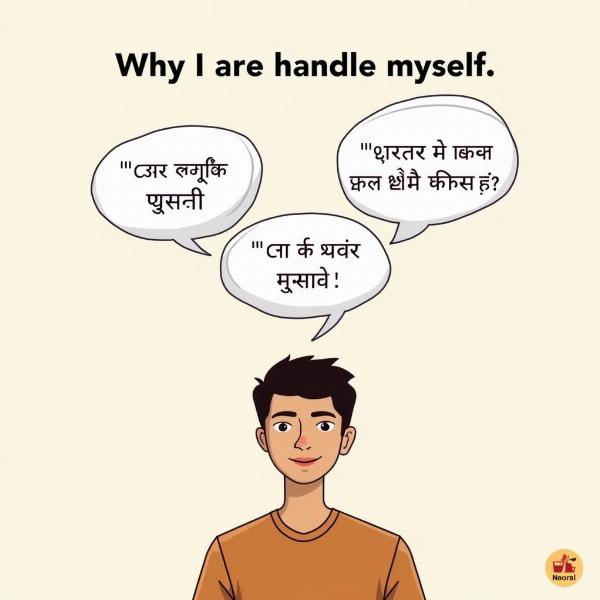Understanding the phrase “I can handle myself” is crucial for effective communication, especially in cross-cultural contexts. This phrase, commonly used in English, implies self-sufficiency and the ability to manage one’s own affairs without needing assistance. For Hindi speakers, finding the perfect equivalent requires understanding the nuances of both languages. This article explores various ways to express “I can handle myself” in Hindi, considering different situations and cultural contexts.
Different Ways to Say “I Can Handle Myself” in Hindi
Translating “I can handle myself” directly into Hindi can be tricky. The best translation depends on the specific context. Here are some common options:
-
मैं अपना काम खुद कर सकता/सकती हूँ (Main apna kaam khud kar sakta/sakti hun): This translates to “I can do my own work myself.” It emphasizes self-reliance in completing tasks. This is a suitable translation when discussing work or responsibilities.
-
मैं खुद संभाल सकता/सकती हूँ (Main khud sambhal sakta/sakti hun): This translates to “I can handle myself.” It’s a more general expression of capability and self-sufficiency, suitable for various situations.
-
मुझे किसी की ज़रूरत नहीं है (Mujhe kisi ki zaroorat nahi hai): This means “I don’t need anyone’s help.” It’s a more assertive way of expressing independence, often used when declining assistance.
-
मैं अपना ध्यान रख सकता/सकती हूँ (Main apna dhyan rakh sakta/sakti hun): This translates to “I can take care of myself.” This is appropriate when referring to personal well-being and safety.
Choosing the Right Phrase
The best way to express “I can handle myself” in Hindi depends on the situation. Consider the following examples:
- In a professional setting: “मैं अपना काम खुद कर सकता/सकती हूँ (Main apna kaam khud kar sakta/sakti hun)” is appropriate.
- When declining help: “मुझे किसी की ज़रूरत नहीं है (Mujhe kisi ki zaroorat nahi hai)” conveys a clear message of independence.
- When assuring someone about your safety: “मैं अपना ध्यान रख सकता/सकती हूँ (Main apna dhyan rakh sakta/sakti hun)” is reassuring.
- In a general context: “मैं खुद संभाल सकता/सकती हूँ (Main khud sambhal sakta/sakti hun)” works well.
 Choosing the right Hindi phrase for "I can handle myself"
Choosing the right Hindi phrase for "I can handle myself"
Cultural Nuances
While expressing self-reliance is valued in Indian culture, it’s important to be mindful of politeness. Avoid being overly assertive, especially when speaking to elders. Sometimes, accepting help graciously can be more culturally appropriate than insisting on complete independence. Consider the relationship and the situation before choosing your words.
Expert Insight
Dr. Anita Sharma, a renowned linguist specializing in Hindi and English, notes: “The phrase ‘I can handle myself’ carries cultural baggage. While direct translations exist in Hindi, the culturally appropriate way to express self-sufficiency varies depending on the context. Politeness and respect are paramount in Indian communication.”
Conclusion
Expressing “I can handle myself” in Hindi involves understanding the nuances of both languages and cultures. Choosing the right phrase depends on the context, relationship, and desired level of assertiveness. This article provides a comprehensive guide to navigating these complexities and communicating effectively. Remember, mastering these nuances can significantly enhance your interactions in a Hindi-speaking environment.
FAQ
- What is the most common way to say “I can handle myself” in Hindi? “मैं खुद संभाल सकता/सकती हूँ (Main khud sambhal sakta/sakti hun)” is a common and versatile option.
- Is it rude to say “I don’t need help” in Hindi? It can be perceived as rude, especially towards elders. Politeness is crucial in Indian culture.
- How can I express self-reliance without being assertive? Use phrases like “मैं अपना काम खुद कर सकता/सकती हूँ (Main apna kaam khud kar sakta/sakti hun)” to focus on capability rather than rejecting help.
- What is the literal translation of “I can handle myself”? There isn’t one single literal translation. The meaning is conveyed through different phrases depending on the context.
- Why is it important to understand cultural nuances when translating? Direct translations can sometimes be misleading or even offensive. Cultural nuances ensure accurate and respectful communication.
Meaning-Hindi.in is your trusted partner for all your Hindi translation needs. We specialize in Business & Commercial, Legal & Certified, Technical & User Manual, Website & Localization, Educational & Academic, Express Translation, and Specialized Translation services. Our team of expert linguists ensures accuracy, cultural sensitivity, and timely delivery. Need help with your next translation project? Contact us today at [email protected] or call us at +91 11-4502-7584. Meaning-Hindi.in is committed to bridging the language gap and connecting you to the world.